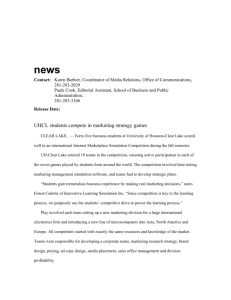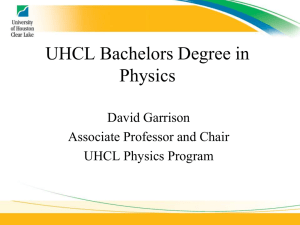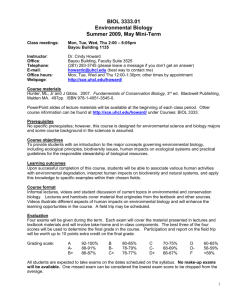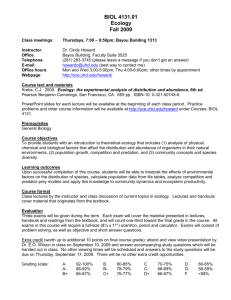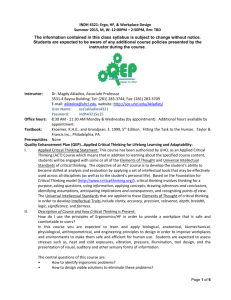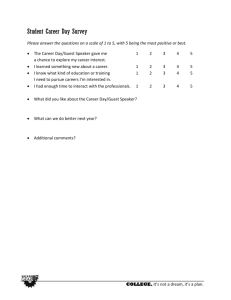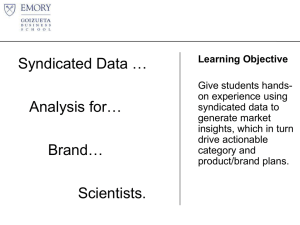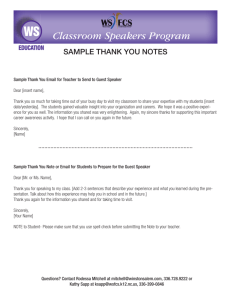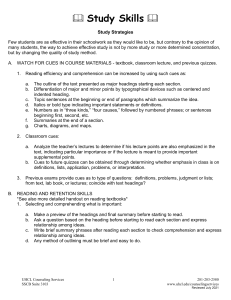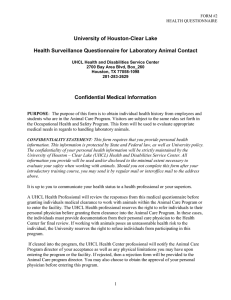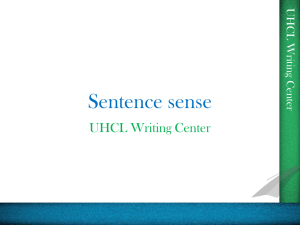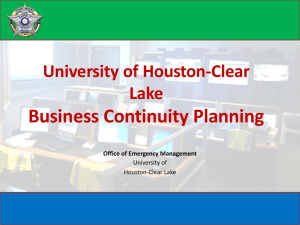Syllabus - University of Houston
advertisement
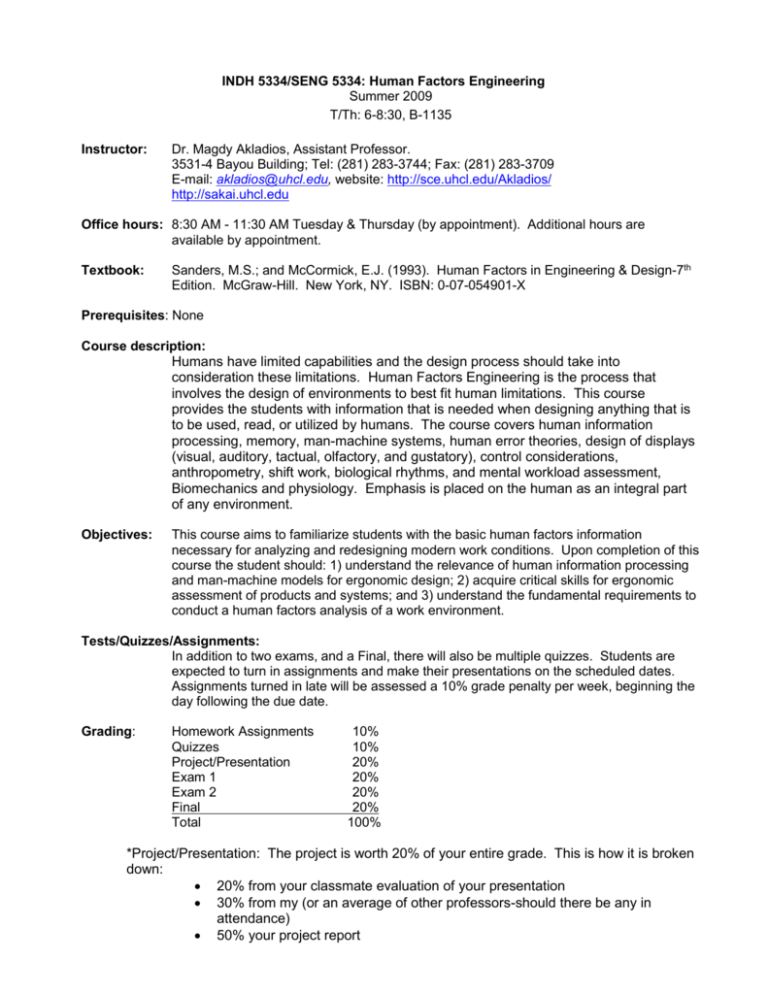
INDH 5334/SENG 5334: Human Factors Engineering Summer 2009 T/Th: 6-8:30, B-1135 Instructor: Dr. Magdy Akladios, Assistant Professor. 3531-4 Bayou Building; Tel: (281) 283-3744; Fax: (281) 283-3709 E-mail: akladios@uhcl.edu, website: http://sce.uhcl.edu/Akladios/ http://sakai.uhcl.edu Office hours: 8:30 AM - 11:30 AM Tuesday & Thursday (by appointment). Additional hours are available by appointment. Textbook: Sanders, M.S.; and McCormick, E.J. (1993). Human Factors in Engineering & Design-7th Edition. McGraw-Hill. New York, NY. ISBN: 0-07-054901-X Prerequisites: None Course description: Humans have limited capabilities and the design process should take into consideration these limitations. Human Factors Engineering is the process that involves the design of environments to best fit human limitations. This course provides the students with information that is needed when designing anything that is to be used, read, or utilized by humans. The course covers human information processing, memory, man-machine systems, human error theories, design of displays (visual, auditory, tactual, olfactory, and gustatory), control considerations, anthropometry, shift work, biological rhythms, and mental workload assessment, Biomechanics and physiology. Emphasis is placed on the human as an integral part of any environment. Objectives: This course aims to familiarize students with the basic human factors information necessary for analyzing and redesigning modern work conditions. Upon completion of this course the student should: 1) understand the relevance of human information processing and man-machine models for ergonomic design; 2) acquire critical skills for ergonomic assessment of products and systems; and 3) understand the fundamental requirements to conduct a human factors analysis of a work environment. Tests/Quizzes/Assignments: In addition to two exams, and a Final, there will also be multiple quizzes. Students are expected to turn in assignments and make their presentations on the scheduled dates. Assignments turned in late will be assessed a 10% grade penalty per week, beginning the day following the due date. Grading: Homework Assignments Quizzes Project/Presentation Exam 1 Exam 2 Final Total 10% 10% 20% 20% 20% 20% 100% *Project/Presentation: The project is worth 20% of your entire grade. This is how it is broken down: 20% from your classmate evaluation of your presentation 30% from my (or an average of other professors-should there be any in attendance) 50% your project report Here is what I look for on your report: Cover page, TOC, Abstract, Intro, Body, Conclusion. Your Body may include Methods, Analysis, Results, Discussions, or some combination of these. A good print quality, titles, good layout, readability, flow, a strong reference list to indicate extent of research and effort, the type of sources (recent vs. old), etc. Relevance of the topic to the class Amount of your own scholarly thinking and intellect going into the project Grading scale: A 92-100% B78-79% D+ 66-67% AC+ D 88-92% 76-77% 60-65% B+ C D- 86-87% 70-75% 58-59% B CF 80-85% 68-69% <58% Academic Honesty: All students at the University of Houston-Clear Lake are expected to maintain complete honesty and integrity in all academic work attempted while enrolled at the University. This standard of conduct includes reporting incidents of alleged violation of the honesty policy to the instructor involved or, if necessary, to the appropriate academic dean. Each student acknowledges, by the mere act of turning in work for a grade, that he or she has honored the Academic Honesty Code, which states, “I will be honest in all my academic activities and will not tolerate dishonesty.” Your participation in this class constitutes your acceptance of the UHCL Academic Honesty Policy. Students with Disabilities: If you are certified as disabled and are entitled to accommodation under the Americans with Disabilities Act, Section 503, please see the instructor as soon as possible so that arrangements for accommodation can be made. If you are not currently certified and believe you may qualify, please contact the UHCL Health and Disability Services Office at 281-283-2627. Other Important Information: UHCL Police: 281-283-2222 UHCL Weather Hotline for Building closings: 281-283-2221 Tentative Course schedule # Date 1 June 9 2 3 June 11 June 16 June 18 4 5 6 7 8 June 23 June 25 June 30 July 2 9 July 7 10 July 9 11 July 14 Topic Course overview: History, Ergonomics, Anthropometrics, Biomechanics, Design, and Systems (Ch 1, pp. 3-21). Human Beings as Information Processors - sensory systems (Ch 3, 47-65) Memory system, attention, decision making systems (Ch 3, 65-85) Visual Display design - Static information (Ch 4, pp.91-117), Visual codes, Ch 4: Symbols & graphics (Ch 4, pp.117-128) Q1 + Visual Displays of Dynamic information (Ch 5, pp.132-158) Exam 1 Guest Speaker: Dr. Chris Monteressi, Topic: ADA in the workplace Non Visual Displays: Auditory, Olfactory, Tactual & Gustatory Displays (Ch 6, pp.160-192) BioRhythms Biomechanics, Muscles, work, typical Syndromes Control design (Ch 11, pp.334-379) 12 July 16 July 21 13 14 15 16 17 July 23 July 28 July 30 August 4 Updated: By: Exam 2 Guest Speaker: Dr. Chris Monteressi: Cell Phone Usage While Driving (Practical Examples of Vigilance and Attention) Guest Speaker: Dr. Camille Peres (an Intro to Usability + HCI) Project Presentations Guest Speaker: Dr. Chris Monteressi: Cognitive Bypass Final Exam March 7, 2016 Dr. Magdy Akladios May also possibly add: HF in System Design (Ch 22, pp. 726) Env. Controls (illumination, climate, noise, etc) Chs 16-19: pp. 511 Guest Speaker: Mr. Steve Umbach (Industrial Design) Display/Control relationships (Ch 10, pp.301-331)
